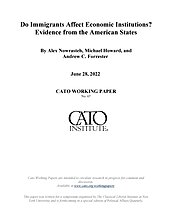The US economy is productive because of its high-quality economic institutions. The higher productivity of the US economy attracts immigrants who generally come from poorer countries that historically have had lower quality economic institutions. Immigration from less productive countries to more productive ones raises immigrant incomes, the incomes of natives, and gross world product. However, immigrants could reduce those economic benefits if they undermine the economic institutions that are the source of higher productivity. Alternatively, immigrants may not affect economic institutions, in which case government restrictions on immigration are imposing many trillions of dollars in annual deadweight loss. This paper uses an epidemiological model to investigate how heterogeneously distributed immigrants affect the economic institutions of American states over the 1980–2010 period under the assumption that institutions are highly responsive to changes in the immigrant population. We find evidence that state economic institutions do not change much in response to immigrants. Our estimates suggest that the mean quality of state economic institutions would be 1 standard deviation higher in 2010 if state economic institutions were more responsive to changes in the immigrant population.
Do Immigrants Affect Economic Institutions? Evidence from the American States
The global economic gains from free immigration dwarf any other single economic policy reform.



